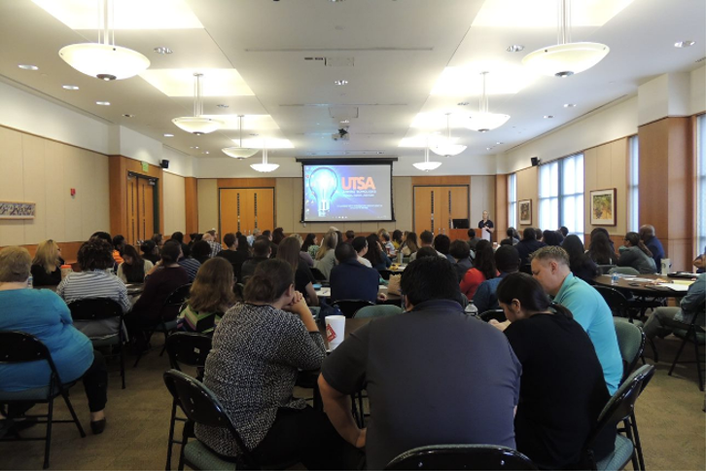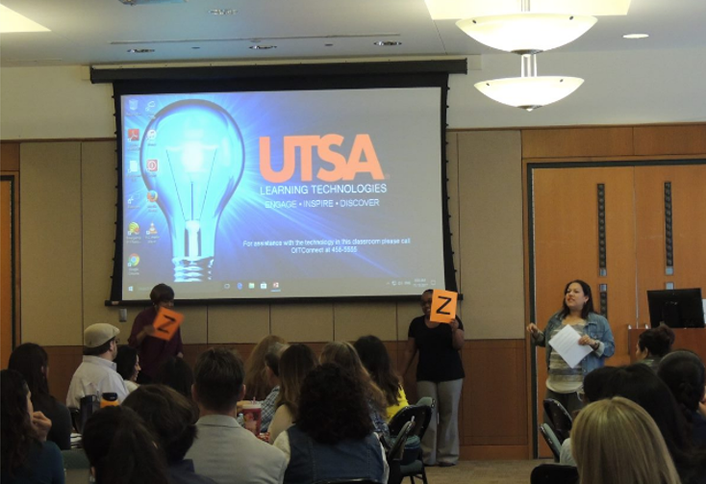
This post is the fourth installment from iPASS grant recipient University of Texas at San Antonio. Read earlier posts for the Transforming Higher Ed series:
As institutions continue to transform to meet the needs of a diversifying student population, opportunities for professional development along with memberships in professional organizations are critical. Participating in development opportunities such as conferences and attending or giving presentations are essential toward sharing best practices that help advance student success.
The amount of foresight and planning that often go into such efforts is not lost on university administrators. Vanessa Hammler Kenon, Ed.D., Associate Vice Provost for IT and Principal Investigator for the Integrated Planning and Advising for Student Success (iPASS) project at the University of Texas at San Antonio (UTSA), recently offered her support for her advising colleagues on campus. "We have an outstanding advising team here at UTSA, and it is a joy to serve as a part of a team that is so committed to student success."
Each month at UTSA, advisors from across campus gather for the All Advising Meeting. The event is akin to a family reunion, with greetings, stories, and genuine care for one another, which is reflective of the institution's welcoming familial culture. This meeting provides a time for advisors to network, discuss issues, receive training on new initiatives, and share information gathered from conferences to help grow their community. The November 2017 meeting featured presentations from advisors who attended the National Academic Advising Association (NACADA) Global Community for Academic Advising annual conference in October, where they shared their takeaways from several sessions (see figure 1).

Advising Director Cynthia Rodriguez believes that investing in relevant associations and events can pay dividends for an institution's advising services. "Attending national conferences is important because this is where best practices can be shared," Rodriguez said. "As presenters, we not only provide our experiences with others, but we are also afforded the opportunity to connect with colleagues from all over the nation to bring back ideas for more efficient processes."

Several advisors from UTSA were able to attend this year's NACADA annual conference, where they presented and moderated sessions. This included Executive Director of Academic Advising Barbara Smith, Director of Academic Advising Cynthia Rodriguez, and Academic Advisors Betsy Haddad and Margaret Garcia, who were selected to represent UTSA at the NACADA event.
The trip was funded by the New Media Consortium (NMC) along with support from the Bill & Melinda Gates Foundation. The UTSA advising team was selected by EDUCAUSE and Achieving the Dream to promote the university's work as a part of the iPASS grant program via presentations at the NACADA annual conference.
Barbara Smith believes that "providing training and professional development opportunities for academic advisors is critical for them to successfully support their diverse student population and needs. By ensuring academic advisors have opportunities to share their practices and learn from their colleagues at national, regional, state, and institutional levels, we are committing to our students and their success."
From the advising team's attendance at the conference, several themes were identified and presented, including:
- Student coaching: Advisors reflected on how to provide powerful coaching during their advising sessions. At the center of this conversation was the core concept of posing insightful questions to students and listening to provide both powerful and engaging advising. Students need to be empowered. Exercises to help assess students, such as those that enable them to express themselves and share what might be affecting their academic success, are central to providing students and advisors the tools needed to address issues. Moreover, exercises to coach students toward adopting a growth mindset versus a fixed mindset, assessing and developing grit, and cultivating other skills are also highly impactful.
- Social justice: The importance of addressing national and global social justice and race issues continues to grow and affect campuses across the nation. Advisors must remain aware of the histories and current positions of these issues and how they might impact future political and cultural conditions in society. College activism plays a central role in many students' experiences, and advisors can help guide students to reflect on their experiences inside and outside the classroom.
- Career services: As advising continues to transform from leadership to front-desk staff, having the right team in place matters greatly. At the conference, attendees discussed the importance of being intentional when creating and refining job descriptions, as well as corresponding leadership and team-building concepts. They shared insights into the myth that administrators have to know everything and how that perception can be harmful in providing effective career services. Building a team by hiring caring people to do thorough, well-informed work with students at the center is essential to success in this area.
- Generational communication: The advising team reflected on the differences between several generations, including Baby Boomers, Generation X, Millennials, and Generation Z. Understanding such differences is critical to connecting with both peers and a diverse student body to provide the most effective advising possible. Each generation can have its preferred communication style and different values that influence decision making. The UTSA Human Resources training team offered training on the topic titled "4 Generations in the Workplace" as a means for further exploration.
- Sharing best practices: There was discussion on the importance of not only publishing articles but also reading articles published by peers. The NACADA blog is an avenue by which advisors connect with what others around the globe are doing and spark discussions with one another. The UTSA advising team also will explore an internal platform for sharing information beyond processes between advisors. Resources and discussions on challenges and success stories will enhance staff motivation by displaying the impact of their work.
The UTSA advising team's presentation topics at NACADA explored the successes, challenges, and milestones achieved in connection to the institution's iPASS grant and in support of various campus initiatives, such as the Coordinated and Linked Approaches to Student Success (CLASS) and the institutional strategic plan, A Vision for UTSA. As a result of UTSA's involvement with iPASS, there has been significant transformational change within the culture of advising as well the technology used at the university. Cynthia Rodriguez views her team's transformation efforts as an exemplar for other institutional advising teams. "We want to be able to be a point of reference to others who may be attempting to implement similar changes in their academic advising."
Rosalind Ong serves as a project coordinator in the Office of Information Technology at the University of Texas at San Antonio.
© 2017 Rosalind Ong. The text of this work is licensed under a Creative Commons BY-NC-ND 4.0 International License.
